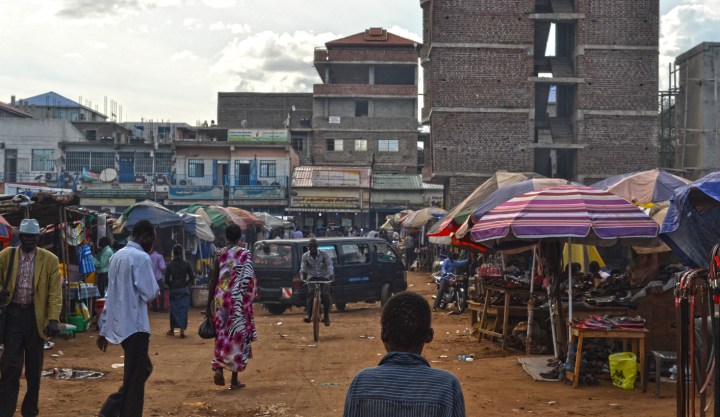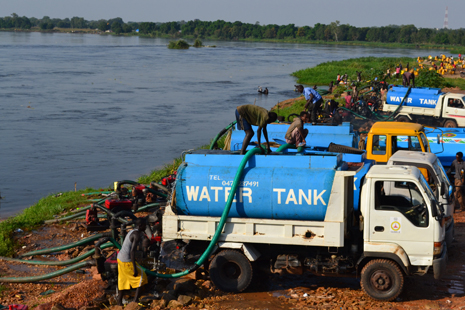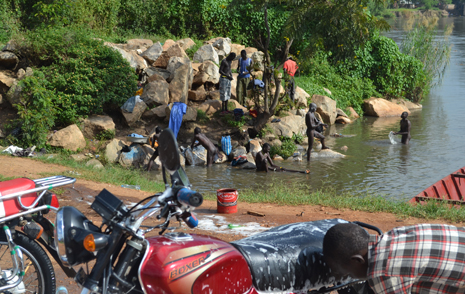Africa
South Sudan: After the euphoria of independence, the anti-climax of reality

In July 2011 South Sudan took charge of its own destiny. SIMON ALLISON reports on the state of the world’s newest nation.
JUBA, SOUTH SUDAN – A new country isn’t a new toy. It isn’t a new computer that you unwrap from its box, all shiny and modern and clean. You don’t plug it into the wall, switch it on and live happily ever after. A new country, almost by definition these days given the long-established hierarchy of states, means quite the opposite: it means that something, somewhere, has gone very badly wrong. A new country is a damaged country, a broken country, a country that is starting again from scratch.
Welcome to South Sudan.
To call it a country stretches the definition somewhat. The government has barely any money. Its authority spreads only as far as it can enforce it (which isn’t far at all, especially during the rainy season when most of the country becomes impassable). Borders, especially with Sudan, remain hazy and ill-defined.
But it has a flag, an anthem, a president and even a place in the United Nations general assembly; urban legend in Juba has it that when South Sudan’s delegation first arrived in New York, panicked UN staffers had to rush out and buy chairs in order to squeeze them in. After their long struggle against the Sudanese regime in Khartoum, the rebels have become the governors.
Their seat, the centre of their limited authority, is Juba, South Sudan’s capital and commercial hub. It’s a basic, low-rise town of cheap buildings and high walls, the paint everywhere cracking under the relentless heat. The main roads are tarmac, but they don’t extend all that far, and even this is a vast improvement since independence day last July, when it was widely (if not exactly accurately) reported that there was just 60km of concrete road in the entire country. This number is a lot bigger now.

Photo: Water tankers in Juba line up to draw water from the river Nile.
Still, big 4x4s are the vehicle of choice for the nouveau riche – the fighters-turned-fatcats and the returning diaspora – and international aid workers, who know that it doesn’t take long for the tarmac to run out. For everyone else, there are minibuses or the ubiquitous boda-bodas: motorcycles that will take you anywhere you want (and sometimes places you don’t) for a few South Sudanese pounds. It is remarkable how clean the boda-bodas are; in fact, how clean all the vehicles are, despite the ever-present dust. Windscreens gleam, bonnets shine, rims sparkle. On every street corner is a young man with a bucket of soap and a pressure hose attached to a portable generator.As every passing truck kicks up another cloud of dust, it’s a Sisyphean task.
Along with the boda-bodas, generators are another constant of life in Juba. The city provides no electricity whatsoever. Every watt must be produced with the aid of loud, smoky motors and expensive diesel. You can’t escape the Juba hum, a constant buzzing in your ear at all times of day and night, except if you stay in a certain cheap hotel, which thoughtfully cut the power (and the air-conditioning – not so thoughtful) at 11pm every evening. And except if you live, as do most people, out of the centre of Juba; as you head out into the surrounds, the city becomes noticeably poorer, and the generators used more sparingly. This holds true for the rest of the country. The further from Juba you go, the less developed its likely to be.
The plan is to change all this, of course. The biggest reason for the long civil war was that the south was marginalised by the north, which excluded southerners from real political power and used the south’s wealth (especially the oil wealth, when it came along) to fund the opulent lifestyles of Khartoum’s elite, and to buy the quiescence of the citizens of the north with lots of investment and subsidies. The south was an irrelevance.
Now the south is in charge of its own destiny, and so far it’s not going all that well. Sure, the superficial indicators of wealth are present: the glossy new banks, the western-style supermarkets, the overpriced hotels and, of course, those plush 4x4s. But it’s yet to trickle down. Clement, 28, is a boda-boda driver, born and raised in Juba. He’s not happy: “There is lots of money here, but if you want some, you need big friends. Only big friends will give you jobs.” Big friends are people with money and connections, and they are far more important still than education and experience (which anyway is in short supply).
The government, meanwhile, is running on empty itself. More than 90% of its revenues come from oil, and since January it hasn’t pumped a barrel due to on-going quarrels with the north. It’s done its best to try and collect taxes for the first time, and impose customs duties, but this was never going to come close to plugging the gap. For several months, government salaries have not been paid, and all forms of social assistance have been suspended (A notice in the Ministry of Finance and Economic Planning told people who usually received social grants to stop asking for them, as they were becoming “annoying”.)
In theory, this should change soon. A deal was struck with the north in September, and the oil taps are in the process of being switched on. This will bring in lots of new money, which should revive the stagnant economy. First on the agenda is building infrastructure, especially electricity. Without electricity, industry and entrepreneurship are essentially dead. One official from the ministry of finance gave me a great example: without electricity, a man who has cows just has cows. With electricity, a man who has cows can make ice-cream. And everybody likes ice-cream. The second priority is developing agriculture. South Sudan is a vast, sprawling country, most of which is in the lush, fertile Nile river basin. Managed properly, South Sudan could be the bread basket of east Africa.

Photo: In the foreground, a young man cleans his boda-boda, while in the background a group of men wash in the river Nile.
The one thing the government is not doing is worrying too much about developing its own industry and manufacturing sectors. A flood of cheap imports and skilled labour from neighbouring countries, especially Ethiopia, Kenya and Uganda, has made it virtually impossible for South Sudanese to compete. So they’re not even trying: implicit in their bid to join the free trade area of the East African Community is a recognition that South Sudan is not going to be an industrial or manufacturing powerhouse in the near or medium term. Instead, removing tariffs will merely make the imports even cheaper (and, incidentally, eliminate the government’s only non-oil revenue stream). This is not a problem, says the finance ministry, because eventually South Sudan’s agriculture will be producing enough to export, and the free market will work in their favour.
I am sceptical. Such a gamble requires a strong, visionary leadership that’s willing to put in the necessary hard work to reap the eventual rewards. This doesn’t square with my impression of the current government, which like the country, is still finding its feet. Bureaucracy and red tape are a nightmare, and petty corruption is rife. More damaging is the evident lack of coordination between different ministries, and the lack of defined roles. This leads to infighting and power struggles, and means that actually getting things done is a long, difficult and arduous process. A simple case in point: when South Sudan imposed its oil boycott last year, the president promised to build a new pipeline through Kenya which would free South Sudan of its reliance on Khartoum. He promised to have it up and running in nine months. This was always an ambitious time scale, but it’s been 11 months, and a contract has yet to be signed. If government can’t even make progress on this – a matter of urgent financial and political importance – then how can they be expected to develop the more mundane areas of governance: education policy, say, or rural development?
For now, many of these functions have been delegated in practise to international aid organisations. The UN presence in Juba is huge; it occupies several large compounds, one of which resembles its own small town, albeit one made up entirely of rectangular pre-fabricated containers.
The relationship between the international community and the government is generally friendly, although it has its difficult moments. Earlier this month, a UN official was expelled for writing a report criticising South Sudan’s human rights record. According to every government source I spoke to, the issue was not about whether or not human rights abuses are committed – everyone acknowledges that some soldiers, after decades fighting in the bush, haven’t learned to tone down their tactics – but that the government would prefer not have these abuses pointed out to them.
Granted, all these problems are teething issues. As I said before: a new country is not a new toy. It is damaged goods, and a lot of time and blood and sweat will go into repairing the ruptures of South Sudan’s history.
It was never going to be an easy process, and it was inevitable that after the euphoria of independence the reality of self-rule would be an anti-climax. And perhaps it is too early to rush to judgment. So far, however, independence has not proved to be the panacea that South Sudanese were hoping for.The only difference is that this time there’s no one to blame for their problems but themselves – which, I suppose, is the point. DM
Main photo: Scene from the bustling central market in Juba, just before the afternoon rains arrive.

















 Become an Insider
Become an Insider